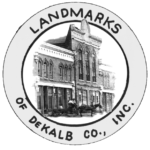Dekalb County Timeline
Some of the events that shaped DeKalb County into what it is today: Land that was originally occupied by the Cherokee Nation.
1780 › The area now known as Fort Payne and DeKalb County was Willstown and Wills County, named for Cherokee Chief “Red-Head” Will Weber.
1820’s › Sequoyah, a Cherokee Indian known for creating a syllabary that taught an illiterate tribe to read and write, moves to Willstown.
1823 › The Wills Towne Mission established. A roadside historical marker commemorates the event.
1835 › Treaty of New Echota signed which brought about the forced removal of Indians and the tragic era of the Trail of Tears.
1836 › County officially named DeKalb County for American Revolutionary War hero Johann Sebastian DeKalb.
1837 › Late in 1837, Federal Troops arrived in Will’s Valley to establish a fort for the purpose of removing the Cherokee Indians from the area.
October 1838 › Last group to depart on Trail of Tears.
1840 › Lebanon becomes the fifth County Seat in four years and the first permanent County Courthouse is built. It served as County Seat for 38 years.
1860’s and 1870’s › The railroad comes to DeKalb County.
1869 › Fort Payne becomes official city name.
May 5, 1878 › Fort Payne becomes County Seat. The current courthouse is one of three in Fort Payne to have been built since 1878.
1884 › Mineral Springs are found in Mentone, touted as healing agent. Mentone Springs Hotel is built nearby the springs as a health spa.
1885 › Coal and Iron Ore are discovered.
1888 › The Fort Payne Coal and Iron Company is organized and the Boom begins.
February 28, 1889 › The City of Fort Payne is incorporated.
1889 › Fort Payne Opera House and the Hardware Manufacturing Company’s 3-story brick building is built.
1891 › The Fort Payne Depot is built.
1893 › Coal and iron deposits play out and a larger vein is discovered in Birmingham’s Red Mountain. Investors pack up and move South. Boom ends.
1903 › The Council Bluff School was erected.
1900’s › Hosiery industry is born in DeKalb County. Today – over 100 plants, employing over 5,000, shipping out over 3-million dozen pairs of socks each week. We are the “Sock Capital of the World!”
